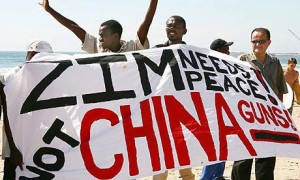China: The Neo-Colonialist?
 A few weeks ago it was announced that Zimbabwe will use the Chinese yuan as an official currency. In exchange, China will cancel the southern African country’s $40 billion debt. Mind you, the US dollar and the South African rand are also de facto currencies in Zimbabwe. Many economists may argue that using the yuan is a good idea to getting around American sanctions.
A few weeks ago it was announced that Zimbabwe will use the Chinese yuan as an official currency. In exchange, China will cancel the southern African country’s $40 billion debt. Mind you, the US dollar and the South African rand are also de facto currencies in Zimbabwe. Many economists may argue that using the yuan is a good idea to getting around American sanctions.
This is just the latest maneuver by China to further penetrate the African continent through trade and development. According to the International Monetary Fund, of the 20 countries worldwide projected to grow the fastest by next year, 10 of them are in Africa. Africa’s population is also expected to double to 3.5 billion by the 2050.
So it would make sense for China and other countries to make a move on potentially big economic opportunities related to the continent’s rich resources and minerals. Approximately over a million Chinese people have moved to Africa in the last 10 years alone as part of a new scramble for Africa. However, many feel that China is doing more harm than good.
Journalist Howard French wrote a book a couple of years called China’s Second Continent: How a Million Migrants Are Building A New Empire in Africa. He traveled to half a dozen African countries to meet with these Chinese migrants about their motivations. They work in a wide variety of occupations, including factory owners, farmers and even prostitutes. Many of them come to Africa because they are either tired of the competitiveness, lack of freedoms and/or lack of economic mobility back in China.
The book left a really bad taste in my mouth and a fear for the worst. Many of the Chinese interviewees sounded the same way European colonizers did during the original Scramble for Africa over a one hundred years ago. Most of the interviewees speak of Africans in a very racist manner, commonly calling them the derogative hei ren.
The biggest gripe with the Chinese businesses is that they hire other Chinese workers – not African workers – to construct big development projects in Africa. The Chinese businesses say they do this because they feel the Africans are not smart enough, childish, and don’t eat bitter, or work as hard as the Chinese. Then when Africans are hired for jobs, they are paid low wages with very limited benefits and in dangerous environments. But many of these problems stem from African governments allowing Chinese business to come into their countries while ignoring their labor laws.
It seems like China is setting up these African countries to be totally dependent on them by just hiring only Chinese workers. It would be more valuable for the continent to practice capacity building, where they train Africans to build and maintain their own infrastructure. Sure, American aid and development projects in Africa have also been known to have shady, ulterior motives in the past as well, including most recently with PEPFAR, but at least Americans mostly hires Africans to work on African projects. Even when I work on any media development projects in Africa, we make a conscious effort to hire locals because the whole point of development is all about, in my opinion, “ teaching someone how to fish.”
There is also a Chinese presence throughout the Caribbean. In Jamaica, where my family is from, there have been similar complaints about Chinese development projects, mostly in the tourism sector with resorts. Recently I was in Kingston and I noticed that the Chinese community self-segregates themselves from other Jamaicans and don’t usually hire locals in their businesses. Jamaicans that are hired are treated poorly. Because of this there is growing hostility towards the Chinese migrant community. A Jamaican friend once told me, “We have replaced British colonization and exploitation with the Chinese. They are only here to exploit us.”
What is most interesting about the Zimbabwe situation is that introducing Chinese currency into the country’s economy takes the Chinese neo-colonialist agenda to a whole new level. China, a country that has a long rap sheet of human rights abuses, is hooking up with Zimbabwe, another country with serious human rights problems. Furthermore, despite the fact that he has been an egomaniacal despot in recent years, Mugabe was originally a freedom fighter 40 years ago who helped Zimbabwe become a free country. Now it feels it feels like the country is moving back into colonialism.
Ghanaian business executive Ed Brown said the best quote in French’s book:
“This [relationship] is going to be determine Africa’s future for the next fifty years. This big question is whether African countries are dynamic enough to take advantage, or whether they’ll end up being the appendage of somebody else all over again.”
